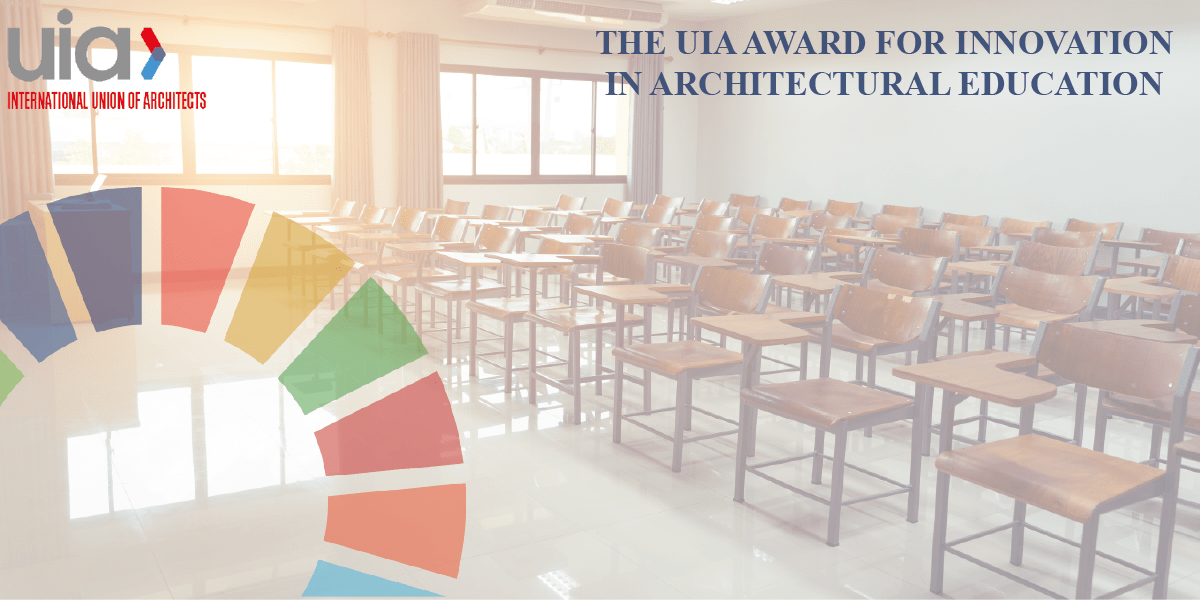
THE UIA AWARD FOR INNOVATION IN ARCHITECTURAL EDUCATION FOCUS ON UN SDGs, 2nd EDITION
Theme and objectives
The Award was established in 2019 to celebrate the multifaceted nature of innovation across the boundaries of cultures and geographies. It also seeks to promote inspiring pedagogical practices that contribute to the creation of sustainable environments. Colleges, schools, departments or programmes of architecture worldwide are invited to submit academic programmes and courses demonstrating:
- Excellence in Pedagogical Practice based on evidence of pedagogical innovation and enhanced learning outcomes
- Excellence in Addressing Sustainable Development Goals based on evidence of innovation in content, identifying challenges and developing of solutions.
Eligibility
The Award addresses university level professional education in architecture or any study programme for professional architectural education worldwide, including university level independent schools/programmes or schools/programmes within public or private universities. The following conditions apply:
- The school/programme must have been established for at least ten years.
- The school/programme must offer a professional degree in architecture which is recognised by its local higher education authorities and/or local validation/accreditation body.
UNESCO-UIA validation is not a requirement for entry.
Jury Members
- Martha Thorne (United States/Spain)
- Howaida Al-Harithy (Lebanon/Saudi Arabia)
- Michael J. Crosbie (United States)
- Anupama Kundoo (India)
- Hermie Delport (South Africa)
Alternate Jury Members:
- Deniz Incedayi (Turkey)
- Efthalia-Thaleia Grigoriadou (Greece)
Technical Committee:
- Ashraf M. Salama (Egypt/United Kingdom), Award Curator
Observers (non-voting) technical committee members:
- Marilys Nepomechie (USA), Iman Gawad (Egypt), Cid Blanco (Brazil)
Results
The Jury awarded 4 entries:
Region 1: Department of Architecture and Civil Engineering, Chalmers University of Technology, Gothenburg (Sweden) – Emilio Brandao, Shea Hagy Marco Adelfio, and Liane Thuvander
“The programme places emphasis on knowledge progression and skills application in a variety of relevant contexts through experience-based learning and the development of hyper-local solutions for real-world problems.”
Region 2: Department of Architecture, Gazi University, Ankara (Turkey) – Semra Arslan Selçuk, Esra Özkan Yazgan, Aysenur Coskun
“Through a community service commitment, this is an impactful studio focusing on retrofitting and adaptive reuse as integral components of sustainability with interesting well-articulated cases addressing various scales of existing built environment stock.”
Region 4: Beijing University of Civil Engineering and Architecture, Beijing (China) – Mu Jun, Hao Shimeng, Jiang Wei, Zhou Tiegang, Jin Yibing, and Ren Zhongqi
“With a very sound pedagogical approach the programme engages with a variety of players coming from different backgrounds and disciplines to work directly with the villagers where everyone learns.”
Region 5: Architectural Engineering & Technology AET Programme, Faculty of Engineering, Cairo University, Cairo (Egypt) – Heba Allah Essam E. Khalil
“The studio work is tied to action research with a great variety of tools and techniques that include assessment, gaming, negotiation, observations, and communication. Students look for unused opportunities in their city in which to intervene, such as vacant land and medians.”
The jury further identified 1 entry to be commended for its inspiring proposal that successfully considers the relationship between the natural and the built environment with equality embedded as a key design parameter, and awarded an Honourable Mention to:
Region 4: Department of Architecture, School of Architecture, Tianjin University, Tianjin (China) – Kong Yuhang, Yang Wei, Zhang Xinnan, Xin Shanchao, Song Yilin, Yang Hongwei, Guo Mengdi, and Zhang Yifan
Designing with Nature and Equality
“The fact that this programme is over a decade old speaks to how much of an influence it has had on shaping a sustainable future. Heavily anchored in scientific research the international component of the programme makes its impact global, as does the interdisciplinary approach.”
The award-winning projects will be exhibited at the UIA Education Commission Exhibition during the 28th UIA World Congress in Copenhagen, Denmark.
Key dates
Prizes
The jury awarded one prize (certificate): for one school/programme located within each of the five UIA Regions. The jury reserved the right to award Honorable Mentions or not to award all the prizes if the entries fell short of the required standards.